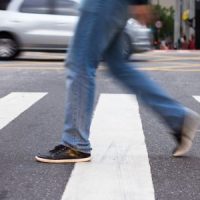Are Pedestrians More Likely To Be Hit By Expensive Cars?

It seems that when pedestrians are hit by cars, the accidents are generally random. Sure, often a pedestrian will be walking where they shouldn’t be, or a driver will be distracted—all factors that contribute to pedestrians being hit. But could there be another variable that makes it more or less likely that someone would be hit by a car?
What about the value of the car that hits the pedestrian? It sounds ridiculous, but according to one study, you may be more likely to be hit by higher value cars than lower value cars.
Study Looks at Value of Cars That Ignore Pedestrians
The study was, admittedly, limited, and may not have been very scientific, but the results are interesting nonetheless. The study was conducted in Las Vegas. The study had people walk in intersections in the city. All crossed the street the same way, in the same intersection, at the same time of day.
The study then looked at the cars and saw which ones slowed down, and which did not (or at least, which ones were not as willing or quick to slow down for the pedestrians—nobody was actually hit by a car for the study).
The study then looked at the cars that slowed down, and those that did not, and gave a book value to the cars. The value was based on the car’s current value, not what it would have been worth brand new.
Correlation Found
Surprisingly, the study in fact did find a correlation between a car’s value and the willingness of the driver of the car to slow down.
Overall, regardless of each car’s value, the results weren’t encouraging: Only 28% of the cars studied even bothered to slow down for the oncoming pedestrians in the intersection. White, female drivers were more likely to slow down, although not by a very large margin. The biggest margin in determining who would and who would not slow down for pedestrians was the value of the vehicle being driven.
As the value of every car increased by $1,000, there was a 3% decrease in the likelihood that the car would slow down for pedestrians. Simply put: The more expensive the car was, the less likely it was to yield to pedestrians in the roadway.
Why Are More Expensive Cars Less Likely to Yield?
Of course, this is just one study, and not a very scientific one. Why the more expensive cars were less likely to slow down is unknown, but there are some theories. Drivers of more expensive cars may have been more likely to rely on pedestrian detection technology, and less likely to observe the roads with their own eyes.
Drivers of more expensive cars may be more likely to be in a hurry to get to work, or the drivers may have jobs that are more time sensitive, making them more likely to be in a hurry.
Were you or someone you know hit by a car? Call the Boston personal injury lawyers at The Law Office of Joseph Linnehan, Jr. today at 617-275-4200 for help with your personal injury case.
Sources:
caranddriver.com/news/a31131731/new-study-says-expensive-cars-are-bought-by-jerks-who-wont-yield/
sciencedirect.com/science/article/abs/pii/S2214140520300359
